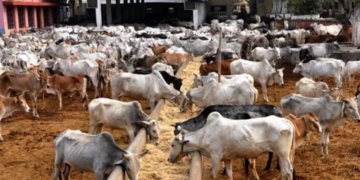The Federal Government has intensified efforts to strengthen disease management in the livestock sector, safeguarding farmers’ investments and boosting national food security.
This was the focus of a high-level meeting held over the weekend, which brought together national, regional and state coordinators, directors of veterinary services, technical experts, farmers’ associations, and development partners, among other key stakeholders.
Speaking at the event, the Minister of Livestock Development, Idi Mukhtar Maiha, emphasised the need for proactive surveillance and swift response mechanisms to combat animal disease outbreaks.
“The red meat industry is committed to working with us to begin exporting meat to the Gulf. However, this depends entirely on how many animals we can certify. One Gulf country alone requires almost 200 tons of meat,” Maiha stated.
He emphasised the importance of strengthening Nigeria’s animal health systems, highlighting the growing movement of animals across African borders.
“From Sudan, DR Congo, Chad, Mali, and Burkina Faso, we receive animals, and we should be in a position to certify the animals coming into our country,” he said.
The Minister charged stakeholders to propose practical, workable solutions aligned with ECOWAS, FAO, and WOAH frameworks that can be incorporated into the 2026 budget cycle.
“Protecting our farmers’ investments is paramount,” he added.
The Permanent Secretary of the Ministry, Dr Chinyere Ijeoma Akujobi, reiterated the Federal Government’s zero-tolerance stance on uncontrolled disease outbreaks and called for stronger collaboration among federal, state, and local authorities.
“Engaging state governors to prioritise disease control is critical. Our farmers cannot be left vulnerable,” she said, adding that six-month action plans should be developed across clusters and value chains to address immediate challenges.
Dr Akujobi further urged the widespread dissemination of the Animal Disease Control Act and related regulations to ensure stakeholders are equipped for effective outbreak response.
During the session, national coordinators presented situation reports on outbreaks of Highly Pathogenic Avian Influenza (HPAI), Foot-and-Mouth Disease (FMD), African Swine Fever (ASF), and Rabies, outlining current interventions and progress achieved.
Outbreaks of FMD in several states were reportedly met with rapid vaccination campaigns, surveillance, and sample collection supported by the Ministry, the National Veterinary Research Institute (NVRI), and regional partners.
Farmers and associations at the meeting appealed for improved access to vaccines, fair compensation for losses, and support to rebuild herds and prevent inbreeding, especially in ASF-affected areas.
The Chief Veterinary Officer of Nigeria (CVON), Dr Samuel Anzaku, highlighted the importance of contingency planning, maintaining adequate vaccine stockpiles, and enhancing diagnostic capacity nationwide.
He noted that timely interventions in outbreak hotspots have limited the spread of disease and protected valuable livestock, reflecting the Ministry’s commitment to the One Health approach.





